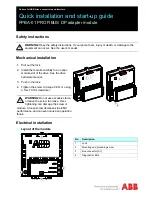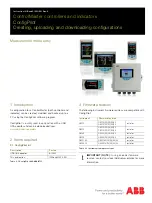
71
6
Commissioning
6.8.5
Tolerance Limit in Direction Air Deficiency
To be able to perform the test, the parameter values in the air deficiency direction should be
known.
WARNING!
If the default setting for dead bands and monitoring bands have changed during commission-
ing, this must be documented clearly.
There is no tolerance in the air deficiency direction if the following parameter setting is re-
tained:
–
For fuel channels and recirculation channels - dead band in positive direction
parameters 42 to 46 = 0 digits
–
For air channels - dead band in negative direction
parameters 32 to 36 = 0 digits
Furthermore, the ’band shift in the event of output change’ (P 709 to P 712) must have the
same value as the monitoring band for the corresponding channel in the air deficiency direc-
tion (P 62 to P 76) so that there is no tolerance on the air deficiency side even when there are
firing rate changes.
If changes are made to this setting, a documented test of the combustion limit values must be
performed, as described previously.
WARNING!
If applicable, the correctness of these parameter settings must be verified. This may be done
by checking the parameters on the device or by checking the values via remote software or
another suitable analysis tool. We recommend the documentation be done in a form of a pro-
tocol. The protocols of the burner settings may contain such a protocol.
Note for the example of a protocol on the next side:
With the aid of a protocol, it is possible to document that a check on the switch off limits is not
necessary due to the relevant parameter settings. The setting values should be listed in the
tables. The numbers are describing the parameter numbers or numbers, on which the settings
are based of. The declarations 1 to 6 would be verified with signature.
Cross out everything which are not applicable.
For excess air:
A reason why excess air is not considered must be inscribed. Otherwise, a test of excess air
has to be done.
Summary of Contents for VMS Series
Page 2: ......
Page 119: ...118 10 Appendix...
Page 129: ...128 10 Appendix Fig 10 9 Ger t 4 Ger t 5 with output regulator...
Page 141: ...140 10 Appendix 10 14 Declaration of Conformity...
Page 142: ...141 10 Appendix...
Page 143: ...142 10 Appendix 10 15 Protocol Example...
Page 144: ...143 10 Appendix 10 16 O2 Setpoint Curves...
Page 145: ...144 10 Appendix...
















































